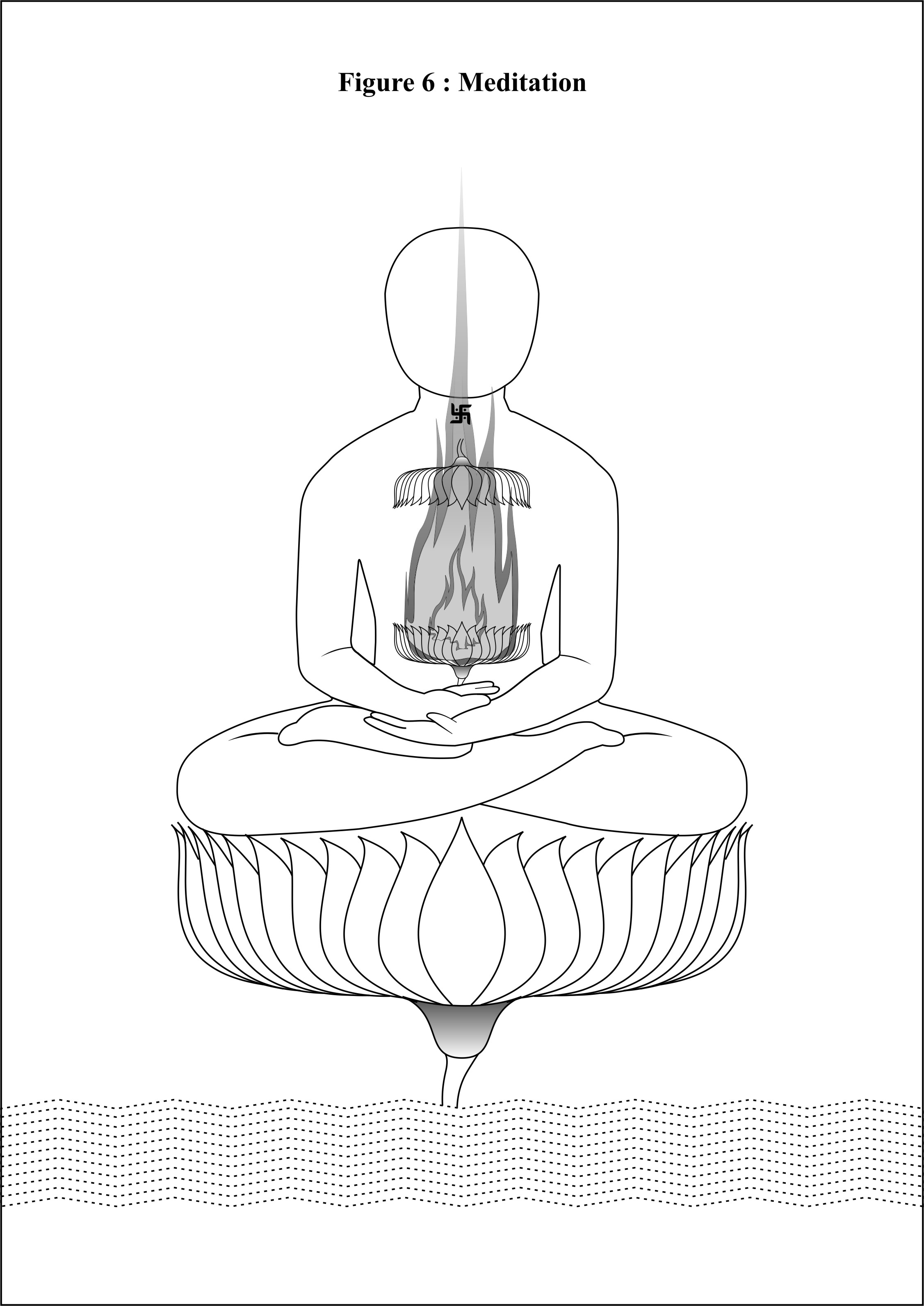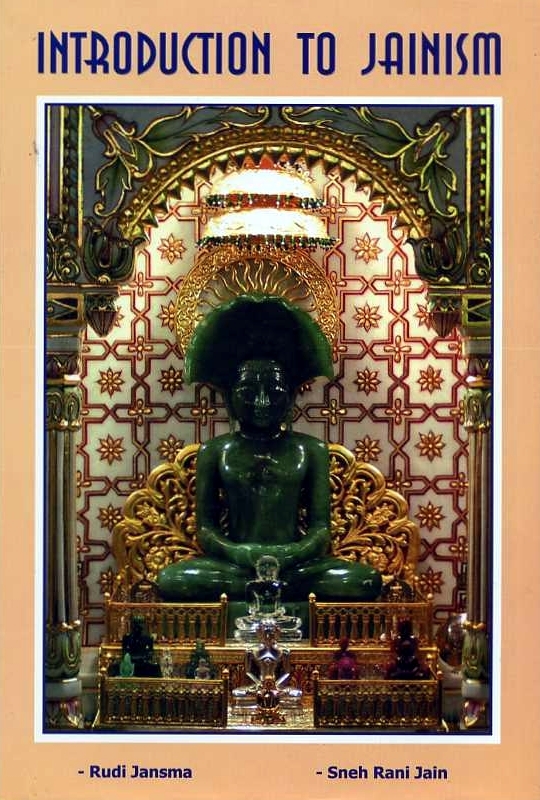
Right knowledge, right vision and right action
are the three jewels of true life
To achieve salvation every one of us must attain a level where we gradually grow in spirituality. This is not a mere posing, but a total inner change that ultimately influences our mentality, speech and behavior. Nobility, compassion, care and pity spring from the heart and are felt for all those who are ailing, suffering and in need. Serenity and calm are felt in the face of those who deny and oppose, gratitude and humility develops towards virtuous and meritorious people, and the heart is filled with humility and devotion towards the gurus. Straightforwardness becomes a natural part of our character without any tensions whatsoever.
Everyone should pray for such qualities before beginning yoga. Yoga is the unification of mind, speech and action.. Instead of orienting the three in an outward direction, in Jainism they are directed inwardly, towards one’s own Self, the soul (jīva). Even if that happens only for a fraction of a second, it is called samayik. Samaya is the indivisible smallest fraction of time. It is the “present.” To live in samayik is called living in the present, because the past has already gone and nothing can be done to save it, while the future depends on the present. Hence the present must be free from follies, and that is samayik. A layman begins with samayik and then enters into yoga and dhyāna (meditation).
To learn something about the meaning of yoga and meditation we must be honest with ourselves and first examine our own mental condition and character. Often we think something different from what we say, and our behavior may again be very different, and that is because we dare not fully rely on our own clarity of mind and purity of intentions. Perhaps our real intentions are hidden behind the self-interest which the world with all its tensions seems to demand of us, and we tend to hide these because otherwise we feel insecure. This makes it difficult to concentrate and sometimes we may get impatient. Often someone’s health is hampered by sleeplessness. One begins to feel irritated and the memory partly fades. Patañjali in his Yogasūtras advises astānga yoga, which includes control of breath (prānayāma), posture (āsana) and meditation (dhyāna) to coordinate mind, speech and action. In the West this form of yoga (especially the hatha yoga aspect of it) has become dominant. But all this does not lead to self-control, though the exercises may have their own usefulness.
Jainism does not recommend this yoga. Patañjali‘s yoga focuses body, speech and mind on one object, but because it is always an external object it leads to the attraction of karmas which attach to the soul and thus cause damage or obstruction. Jainism considers the immortal soul as the highest essence; the soul is the master and the body is a tool, a vehicle that it uses to reach its destination: first equanimity, then liberation. The soul may be compared to the “driver” of a car for whom safety is the first concern and whose task is to care for and maintain his vehicle. He should always keep his destination in mind, and never forget to provide his car with fuel, oil, and water - and he should always be vigilant for all possible kinds of contingencies. He should also have good driving skills, eyes and responses.
In daily life everyone acknowledges that he needs to earn a living to obtain food and shelter. At the same time we maintain relations with family, friends and colleagues with a variety of mental attitudes and a psychology which reflects their descent and education. Even a person with a normally stable character who feels himself at ease may have to contend with an environment which doesn’t suit him. In such circumstances he may react in a way one wouldn’t expect of him. Someone can be hurt deeply within his or her soul, and emotions and passions may be aroused which bind the soul even more tightly to karma. It may be an explosion of anger, sadness, disappointment, depression or even passion. All of these create tension which in turn gives rise to unpleasant ways of reacting. Of course the thinking mind and intelligence are continuously involved, but the one who really suffers is the soul. For that reason these kinds of mental activities which keep the mind focused on one point are sometimes taken for “meditation,” but they are not meditation of the right kind.
Such “meditation” is called durdhyāna or bad meditation in Jainism, and this pollutes the soul. Jainism shows a way to avoid such pollution by means of good meditation: the mind and speech are guided in the right direction so that the soul is unaffected by reasoning. Through meditation the karmic fruits ripen faster and the new influx of karmas is checked. Thus meditation is the kind of activity that serves the soul while making use of body and speech. Just as someone who drives an old car may expect problems, in the same way we can harm the soul immensely by thinking in the wrong way. Almost everyone will have at least some thoughts during the day which may be called “bad meditation” because we are not aware of the harm such thoughts may bring to our soul. We ridicule or criticize people; we pay attention to the faults and weaknesses of others, while at the same time we avoid facing our own; we may be jealous when seeing the successes of others, we boast, backbite, meddle in someone else’s affairs while at the same time we neglect our duties; under a cover of humility and politeness we may carry hatred in our heart; sometimes we are cruel and an urge to possess goods may cause us to act selfishly; we present ourselves as humble, but all the same we maintain a strong sense of ego. All such action makes a man or woman into a petty human being. Jainism advises anyone who wants to do yoga to abandon such mental habits first. Only then can one concentrate with full attention of mind, speech, and body on something of real value.
According to the most commonly practiced yoga systems such concentration is reached by meditating in an easy (preferably lotus) posture in seclusion and staring without blinking at a point on the wall, the rising sun, or the tip of the nose, and as long as one can keep the mind away from the outer world, this strengthens concentration. Garuda is the name Jainism gives to the yoga of self-control and control of mind, body and speech, so that even earth, water, fire and air can come under one’s control. Śiva is in Jainism control over the passions and the acquisition of such self-control that under all circumstances equanimity is maintained. Kāma, passion, is the forbidden snake which can endanger any yogi. Yoga means a united focus on mental, spiritual, and verbal attentiveness. This can serve good as well as evil purposes. Åchārya Kumundendu mentions in his Jñānārnava that people often practice yoga out of desire to acquire special powers for making worldly gains and sometimes to subject demons of a lower kind to one’s will by means of mantras. Sometimes yoga is used for sorcery, hypnosis, revenge, or to kill someone by means of mantra, to gain control over water or fire, to poison a person, to practice witchcraft, to perform magical attacks and to control certain goddesses so that they perform particular tasks according to the yogi’s wishes. Yoga is also used to be able to stay under water, or to enter an underworld, to gain control over death, to move through the air or to walk on water etc. Yoga may be performed to get visions about where a treasure is hidden, to make oneself invisible and to obtain many other powers. Such types of yoga are a danger for the soul (and this means much), are based on wrong belief and are therefore regarded as durdhyāna - evil meditation. Jainism only supports yoga which has the betterment of the soul as its aim by means of right insight, right knowledge, and right behavior, so that the inflowing karmas are either of the good type, or, best of all, no more karmas are attracted and attached to the soul. The latter is called samayik, in which the mind, speech and action are quieted, and is called trigupti when silenced for a desired duration.
To be able to perform Jain yoga it is compulsory to first abandon all personal hopes and desires because these poison all that one may gain and may drive the senses to insanity - with all its inherent misery. A yogi must observe celibacy to be able to use his energy fully for the purpose of concentration alone. At any time one should be alert to how one walks (not stepping on living creatures etc.) cares for others, speaks, eats, picks up and puts down objects and so on. One who aspires to make spiritual progress should live constantly in agreement with right vision or intuition, right knowledge and right (i.e. nonviolent) conduct. While practicing meditation a yogi has to abandon mentally all his possessions. He or she should purify him or herself by abandoning every aversion or attachment which may lead to degradation of thoughts.
The Jains reject tantric meditations, because they involve harm being done to other beings and sometimes sexual passion and the taking of alcohol and drugs. Moreover they reject any practice that leads to the forcible acquisition of powers or selfish accomplishments. Jain meditation is only directed towards wisdom and purity.
Jains, lay people as well as sworn clergymen and women, attach very great importance to vegetarianism. Every real Jain is a strict vegetarian, i.e. including eggs and fish, and for the practice of yoga and meditation it is an absolute condition. Meditation depends on the direction the mind chooses. Usually our mental activities during daily life are not very spiritual and we pay most of our attention to what will bring satisfaction to the senses. Such enjoyments may be at the expense of other living beings with which we share our world. This is the only cause why the eating of meat was ever introduced by humankind. Curiosity has even induced certain people to eat the flesh of other people. Such creatures can no longer be called human - they are beasts on two legs. It is the duty as humans to be fundamentally human or humane because our minds are superior to those of all other creatures. Because humans are the most advanced creatures on earth, they should never break the laws of nature for any selfish purpose. The biological constitution of the human body is both anatomically and physiologically that of a vegetarian. He has however imitated the for humans unlawful act of meat-eating and hunting from dogs etc., and even though humanity claims to have made progress in civilization, it has in reality made a step backwards. According to the Indians, humans were vegetarians originally, whether the first man was called Adam or Rasul, and that remained the case for long periods on Jambūdvīpa (our present earth). What we eat has a huge influence on our psychology, and that is why vegetarianism is an absolute precondition for the practice of yoga, and one is supposed to eat sattvic, i.e. ‘wise’ food. Excessive, fatty, spicy food or foods of a bad quality, such as leftovers and meals that are prepared with indifference should be avoided. Milk and diary products are however regarded as “vegetarian“ by the Jains, and they call it “the nectar of Mother Cow.” But the cows are not milked mechanically. One allows the calf to drink first, or takes care that enough milk is left for it. A Jain has a friendly relationship with his cattle, and the cow generously gives the milk she doesn’t need for the calf; and if she doesn’t want to give milk she just jumps away.
 Dr. Sneh Rani Jain
Dr. Sneh Rani Jain
 Publisher:
Publisher: